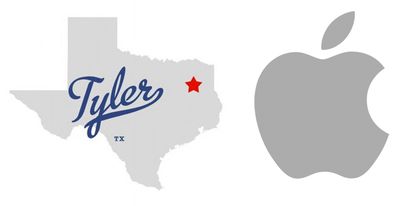The Supreme Court of the United States today decided that U.S. companies may only face patent infringement lawsuits in the jurisdiction in which they are incorporated, which in Apple's case would be California.

The decision is significant for Apple, as the iPhone maker faces several patent infringement lawsuits in a single district court in Eastern Texas that is considered friendly to patent holding entities, or so-called "patent trolls."
That very court in Tyler, Texas has, for example, ordered Apple to pay $532.9 million to patent licensing firm Smartflash LLC in 2015, and $22.1 million to Acacia Research last September for infringing upon patents it acquired from Nokia.
By limiting where patent infringement lawsuits can be filed, the Supreme Court's decision means that Apple will likely be able to battle patent infringement lawsuits in Northern California, and finally put East Texas behind it.
The Supreme Court's decision today relates to a Delaware-based lawsuit between Heartland Food Products Group and The Kraft Heinz Company, but it extends to all domestic companies across the United States.
Update: The appears to be considerable confusion throughout media coverage of this ruling. The ruling narrowly limited a company's "residence" to the place of incorporation, but patent lawsuits may still be filed anywhere "the defendant has committed acts of infringement and has a regular and established place of business." As a result, it appears patent lawsuits can still be filed against Apple in many jurisdictions, including the Eastern District of Texas.






















Top Rated Comments
"Apple announces plans to close all stores in east Texas."
http://investor.apple.com/faq.cfm
[doublepost=1495478124][/doublepost]I ensure you that's not the case. I was misguided by the dozen or so credible media publications that positioned this news with the angle that I also did. However, I admit that I failed to "do my homework" in this situation. I strive for factualness and accuracy at all times, so trust me when I say that this disappoints me. MacRumors has never instructed me to write articles in a manner that gets "quick clicks," and it's not something I stand for.
It would seem to me that infringing acts required to qualify a non-HQ site would only entail acts to incorporate the offending technology, such as manufacturing and design.
So not just Northern California.
The fight was what "resides" means:
28 USC 1400(b):
Any civil action for patent infringement may be brought in the judicial district where the defendant resides, or where the defendant has committed acts of infringement and has a regular and established place of business.
"Resides" now means "where the corporate defendant is incorporated" (e.g. Delaware). The part after the "or" hasn't changed.
Updated: ok, looks like they are incorporated in northern california, but that doesn't change the rest of my point. They can be sued LOTS of places, including possibly eastern texas.